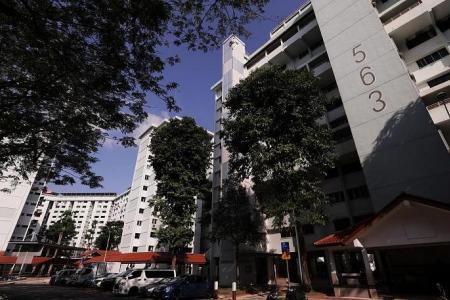Nearly all 540 Ang Mo Kio Sers residents need not top up for new flats if they take up 50-year lease
Nearly all of the 540 Ang Mo Kio residents aged 45 years and above will not have to top up any money to move into a similarly-sized replacement flat if they opt for a 50-year lease, said National Development Minister Desmond Lee.
He gave this update on residents affected by the Ang Mo Kio Selective En bloc Redevelopment Scheme (Sers) in response to Ms Nadia Ahmad Samdin (Ang Mo Kio GRC), who had raised the issue in her adjournment motion on Monday (July 4).
The 50-year lease option is one of two new rehousing options announced by the Housing Board on Saturday to address concerns raised by Ang Mo Kio Sers owners about having to fork out cash for similar-sized units at the designated replacement site next to ITE College Central.
On Monday, Mr Lee said HDB introduced these options in recognition of the challenges faced by older residents.
"To some of them, a brand new 99-year term may be less important than a similar-sized flat in a familiar locality," said Mr Lee.
"A 50-year lease would be more affordable and with a lease term around the same as the balance lease of their current flat," he said, adding that the option would provide them with a home for life until the age of 95.
The HDB will offer affected residents at Blocks 562 to 565 Ang Mo Kio Avenue 3 three-room or larger flats at the replacement sites on a 50-year lease, if the new flat is able to last the owners until they are 95.
It will also offer the lease buyback scheme to Sers flat owners aged 65 and over, who can then buy a short-lease replacement flat after that.
Both options will apply to all future Sers projects, and to flat owners of Blocks 212 to 218 Marsiling Crescent/Lane whose flats will be acquired for the expansion of Woodlands Checkpoint.
Mr Lee said the two additional options are an extension of existing measures to meet the needs of seniors, such as the two-room flexi scheme and the lease buyback scheme.
"Looking ahead, the flats involved in future Sers exercises are likely to be older with shorter remaining terms and such needs may arise too," he noted.
HDB has said that only about 5 per cent of all HDB flats are suitable for redevelopment under Sers, and most of these projects with high redevelopment potential have already been selected.
Mr Lee noted that the short lease options are consistent with the key principle that the length of a flat's remaining lease affects its market value.
In her speech, Ms Nadia, who is MP for the affected residents, said while they were appreciative of the 50-year lease option, some concerns remain.
Citing a leasehold table that computes how tenures affect land value - a table informally known in real estate circles as the Bala's Curve - Ms Nadia said the financial value of leases decay in an accelerated fashion towards the end of the lease.
She then sought assurance that no residents will have to top up further funds should they choose the 50-year lease option. "And if it's not the case, then what will HDB's approach be to ensure that no resident is disadvantaged?"
In response, Mr Lee said a flat with a 50-year lease is not half the price of a flat with a 99-year lease, as a flat's market value does not follow a straight line.
The value of assets, including leasehold properties, is calculated based on the time value or money, or the concept that $1 today is worth more than $1 in future, he added.
"Adopting this principle, the value of the first 50 years of the lease is expected to be worth more than the value of the last 50 years. But a shorter lease flat would be more affordable than a longer lease flat, all things equal," he said.
HDB will consider offering affected residents who do not meet the criterion to apply for a 50-year lease or face extenuating circumstances on a case-by-case basis, he said.
Ms Nadia pointed out that approximately one in four residents will need to pay a resale levy using their sales proceeds or in cash, and asked if the payment could be waived or deferred given that Sers is involuntary.
She also asked about the implications of a 50-year lease, which would lead to a "curious mix of flats with varying leases, potentially creating price distortions in the market".
Many residents have also expressed disappointment over the estimated valuation of their flats, she said, noting that the new site has fewer bus services and is less accessible to wet markets compared with the Sers site.
She also highlighted the Sers site's proximity to the future Tavistock MRT station on the Cross Island Line. "Works for the MRT station started and residents will be putting up with the dust and noise but not able to reap the benefits," she said.
In response, Mr Lee said the basis of determining the compensation for the Ang Mo Kio Sers flats remains the same as past exercises, where a private valuer takes reference from recent transactions of comparable resale flats, the remaining lease, flat attributes including condition and extent of renovation work, and information on existing and upcoming amenities and infrastructure in the area.
The key difference, he said, is that the Ang Mo Kio flats are older - with a balance lease of about 57 years at the point of the announcement - compared to about 70 years in past Sers exercises.
Get The New Paper on your phone with the free TNP app. Download from the Apple App Store or Google Play Store now


